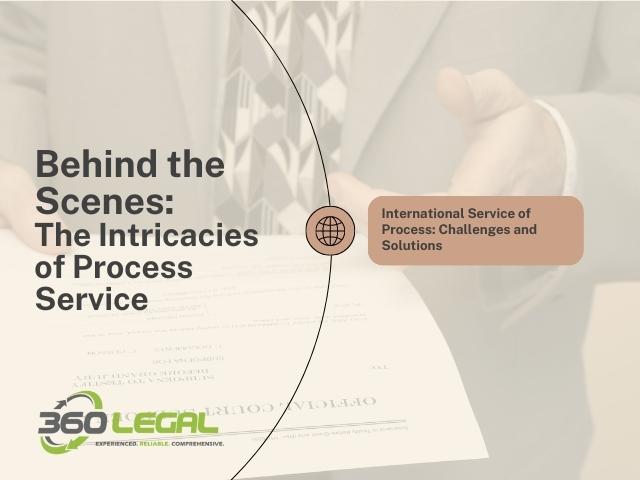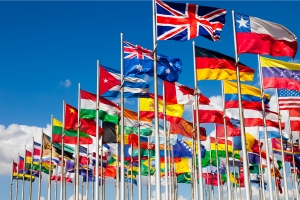Testing RSS Feeds.. ignore post.
Testing RSS Feeds.. ignore post.
International Service of Process: Challenges and Solutions

In an increasingly globalized world, legal proceedings often cross international borders. This presents a unique set of challenges for process service. At 360 Legal, we pride ourselves on our ability to navigate these complexities and deliver reliable, effective service of process, regardless of location. In this article, we’ll explore the challenges of international service of process and the solutions that 360 Legal offers to overcome them.
Understanding International Service of Process
International service of process refers to the delivery of legal documents from one country to another. International agreements and the laws of the countries involved govern this process. The most significant of these agreements is the Hague Convention on the Service Abroad of Judicial and Extrajudicial Documents in Civil or Commercial Matters, which provides a framework for international service of process.
Challenges in International Service of Process 
Executing the international service of process can be a complex task due to several challenges:
- Legal Complexity: Different countries have different laws and regulations regarding the service of process. Understanding and complying with these can be a significant challenge.
- Language Barriers: Legal documents need to be translated into the recipient’s native language, which can be a complex and time-consuming task.
- Logistical Issues: Distance, time zones, and local infrastructural issues can make it challenging to serve documents promptly and efficiently.
How 360 Legal Addresses These Challenges
At 360 Legal, we have developed a comprehensive approach to tackle these challenges effectively.
Legal Expertise and Compliance
Our team is well-versed in international law and the rules governing the service of process in different jurisdictions. We ensure full compliance with the Hague Convention and local laws and regulations. We also work closely with local legal professionals in various countries to ensure our methods are up-to-date and legally sound.
Language Translation Services
We understand the importance of accurate translation in process service. To this end, we work with certified translators who translate legal documents accurately into the required language. This ensures that the recipient fully understands the documents they have been served.
Logistics and Coordination
Our dedicated team handles the logistical aspects of the international service of process. This includes coordinating with local process servers, managing time zone differences, and ensuring the timely delivery of documents.
A Potential Scenario
Let’s consider a fictional case where an American business is filing a lawsuit against a former partner in France. The lawsuit alleges that the partner violated their contract. 360 Legal is engaged to serve the summons and complaint to the former partner in France.
Our team first reviews the lawsuit to understand the details and requirements. We then work with a certified translator to translate the documents into French. After ensuring the translated documents are accurate, we coordinate with our local process server in France. Leveraging our understanding of the Hague Convention and French laws, we effectively serve the documents to the former partner, fulfilling our client’s requirements while adhering to international law.
Frequently Asked Questions
1. What is the Hague Convention, and why is it important?
The Hague Convention is an international treaty that provides a framework for international service of process. It’s important because it ensures that the service of process is recognized and upheld across international borders.
2. How long does the International service of process usually take?
The timeframe can vary widely depending on the countries involved, the method of service, and other factors. It can take anywhere from a few weeks to several months.
3. What happens if the recipient refuses to accept service?
The protocol for this situation depends on the specific laws of the recipient’s country. In some cases, service may be considered valid if the process server made a good-faith effort to serve the documents.
Conclusion
International service of process is a complex task that requires expert knowledge, meticulous planning, and precise execution. At 360 Legal, we embrace these challenges. We are equipped to provide practical solutions, ensuring that our client’s legal documents are served promptly and correctly, no matter where the recipient is located.
For more information on the safety protocols for process servers, we recommend visiting the National Association of Professional Process Servers (NAPPS) page. This resource offers many safety tips and guides to help process servers navigate their duties safely.
In addition, the Occupational Outlook Handbook by the Bureau of Labor Statistics provides valuable insights into various professions, including the legal sector. It offers a wealth of data on occupational hazards and safety measures relevant to process servers.
At 360 Legal, our commitment to safety, professionalism, and adherence to legal guidelines sets us apart. We understand the inherent risks involved in process serving and have established protocols to ensure our team can deliver reliable, efficient service in the safest manner possible. If you’re seeking a professional process service with a strong emphasis on safety, contact us at 360 Legal.
Author
We are Social!
Latest tweets
Popular Tags
Testimonials
"5 star service ! prompt serving, helpful, professional . "
"Mike is awesome. Our firm has hired him on several occasions and we are very happy with his work. His prompt serving, helpful, professional and always in communication. I recommend him highly! "
"360Legal provides speedy and easy to use Process Service that is flexible, and very transparent with nearly instant reporting. It is very helpful for us to be able to track the status of our process service jobs, especially when they are time sensitive. "
Latest News
-

RMAI 2021 Annual Conference RMAI Annual Conference
April 12-15, 2021 -

NATIONAL CREDITORS BAR ASSOCIATION 2020 SPRING CONFERENCE
May 19-21, 2021 -

ALFN ANSWERS 2021
Jul 18-21, 2021 -

Annual Convention and Expo
Oct. 17-21, 2021 -

Florida Association of Professional Process Servers 33rd Quarter Board Meeting/Professional Beach Getaway
Aug. 20-22, 2021












